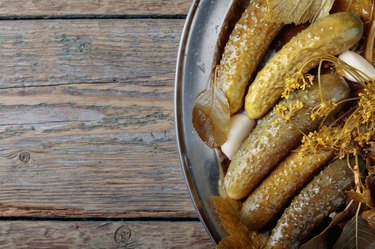
Pickle nutrition information shows that cucumber pickles — made by pickling cucumbers in brine or vinegar for days or weeks — are a low-calorie snack, also popular as a garnish for certain foods.
Tip
According to pickle nutrition information, most types of pickles are low in calories but can be high in sodium. Some types of pickle are also high in sugar. Read the nutritional information before consuming a large amount of pickles, so you are aware of your sodium and sugar intake.
Video of the Day
There are multiple types of pickles available, though the term "pickles" usually refers to pickled cucumbers. Aside from cucumber pickles, you can also commonly find types of pickles made from other vegetables including green beans, beets, onions, carrots, cabbage and peppers.
Video of the Day
Pickle Nutrition Information
According to FoodDataCentral, which is run by the USDA, one sour cucumber pickle spear provides just over three calories, less than 1 gram of protein, carbs and fat and 362 milligrams of sodium. One sweet cucumber pickle spear provides 18 calories, less than 1 gram of protein, less than 1 gram of fat, just over 4 grams of carbohydrates and 91 milligrams of sodium. One dill pickle spear provides four calories, less than 1 gram of fat and protein, almost 1 gram of carbohydrates and 283 milligrams of sodium.
Read more: What Are the Health Benefits of Sauerkraut?
You can read the nutrition information on store-bought pickles to get information on each serving. Because pickles are typically high in sodium, the sodium content is important information to look for.
The Harvard T.H. Chan School of Public Health says that we need roughly 500 milligrams of sodium each day to help with muscle movements, transmitting nerve impulses and regulating fluid levels in the body. However, adults should ideally limit their sodium intake to less than 2,300 milligrams each day.
Health Benefits of Pickle Juice
According to Harvard Health Publishing, some athletes swear by drinking an ounce of pickle juice each night to prevent muscle cramps. We don't know exactly what causes muscle cramping — Harvard Health Publishing says that dehydration or electrolyte imbalances are common theories, but there's little solid evidence.
The Mayo Clinic recommends using self-care measures to treat muscle cramps, like stretching, applying an ice pack or heat pad and taking a warm bath or shower. It's also important to stay hydrated to avoid cramping. The clinic also says that a vitamin B supplement may be helpful, but that evidence is limited that this truly works.
Read more: Does Pickle Juice Increase Metabolism?
The Cleveland Clinic says that many people believe pickle juice can help treat acid reflux. The reasoning behind this is that fermented pickles can provide healthy probiotics. However, the Cleveland Clinic website states that there's little evidence that treating acid reflux is a health benefit of pickle juice.
To treat acid reflux, the Cleveland Clinic recommends eating smaller meals, getting regular exercise, maintaining a healthy weight and staying away from known triggers like very fatty foods or alcohol. It can also be helpful to stop eating a couple of hours before bedtime to prevent acid reflux.
- Harvard Health Publishing: "Is There Hope for Leg Cramp Sufferers?"
- USDA: "Cucumber Pickles, Sour"
- USDA: "Cucumber Pickles, Sweet"
- USDA: "Cucumber Pickles, Dill"
- Cleveland Clinic: "Can Drinking Pickle Juice Help Your Acid Reflux Symptoms?"
- Harvard T.H. Chan School of Public Health: "Salt and Sodium"
- Mayo Clinic: "Muscle Cramps"
- NY Food Museum: Pickle History Timeline
- National Center for Home Food Preservation: Preparing and Canning Pickles for Special Diets
- National Center for Home Food Preservation: How Do I Pickle?